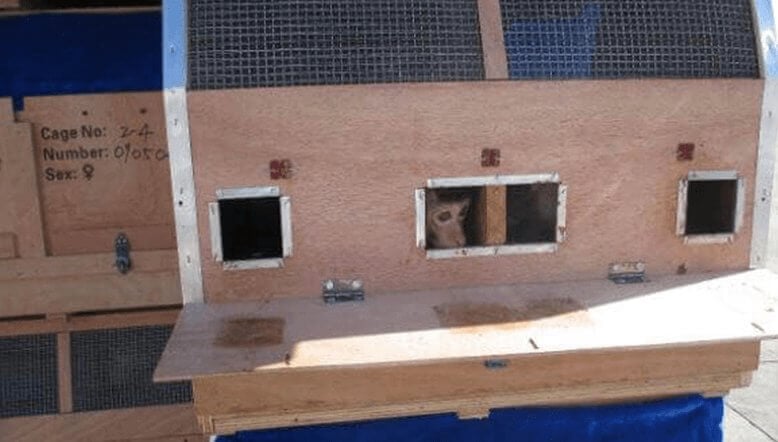Abducting Monkeys From Forests Is Making You Sick—Here’s Why
Experimenters’ voracious demand for tens of thousands of monkeys each year supports a violent, greedy, secretive, and often illegal industry. On top of that, monkeys aren’t good models for humans. For decades, experiments on monkeys have failed to provide cures, vaccines, and treatments for humans. Many experimenters don’t deny that using monkeys who were abducted from their forest homes further skews the results of experiments.
Meanwhile, monkey dealers empty the world’s forests of these animals as they reap growing profits.
Here’s the simple truth: The gluttony of the animal experimentation industry is pushing monkeys to the brink of extinction, compromising science, depriving patients of needed treatments and cures, and serving only to perpetuate itself—and the evidence is straightforward.
Monkeys stolen from the world’s forests introduce uncontrolled and unknown variables. No one knows precisely where they came from, what their parentage is, or what infections they may have, and experimenters can’t know how the monkeys’ immune systems will respond when purposely exposed to pathogens and procedures. All these factors make the results of experiments in which monkeys are used even more misleading.
In addition to the stress of lengthy transportation and confinement that all monkeys destined for labs experience, abducted ones endure added trauma and pain during capture. These factors, again, can skew data—as the animal experimentation industry freely admits.
For precisely this reason, the U.K. banned the capture of wild primates for its use in research in 1996. Similarly, European Directive 2010/63/EU allows for the use of only the offspring of abducted monkeys when monkeys are used in experiments. Australia also prohibits the use of abducted primates in medical research—something the U.S. has recklessly failed to do.
Infections run rampant in monkey populations being rounded up in Asia:
- A multitude of nasty bacteria, viruses, parasites, and fungi have been identified in monkeys caught up in the international importation pipeline.
- These infectious agents further compromise the monkeys’ immune function, thus undermining and distorting experiment results.
- No monkey colonies—especially not wild-caught ones—are pathogen-free.
Even the Centers for Disease Control and Prevention realizes that wild monkeys are a problem:
- After PETA called on the agency to acknowledge and act on the public health risk of importing monkeys, it enacted a new policy. Now, when newly imported monkeys have diarrhea, coughing, abscesses, fevers, or other symptoms of potentially zoonotic diseases, monkey dealers must report it and screen for deadly pathogens, including Shigella, salmonella, and herpes B.
- The agency also now mandates that dealers must treat monkeys who were found to have malaria parasites during screening. This step acknowledges that many monkeys infected with this deadly disease are being brought into the U.S.

The experimentation industry is pushing monkeys to extinction.
The International Union for Conservation of Nature, the global authority for the conservation status of animals, issued a dire report in July 2020 stating that animal experimentation had pushed two species of monkeys to the brink of extinction. Here are some additional facts to consider:
- PETA is petitioning the U.S. Fish & Wildlife Service to add pig-tailed and long-tailed macaques to the Endangered Species List, a move that should greatly restrict their importation.
- Monkeys of all kinds are disappearing from countries around the world—even from the most unlikely of places. Some smugglers are being caught in the act, while evidence of monkey hunting is being uncovered. It may not be long before the monkey experimentation industry causes some of the world’s forests, once teeming with monkeys, to fall silent.
Meanwhile, monkey dealers are getting rich.
Despite mountains of evidence proving that the use of all monkeys—especially those abducted from their homes—is bad for science, patients, and the planet, Charles River Laboratories, one of the world’s largest monkey dealers, posted more than $1 billion in earnings in just the first quarter of this year.
What You Can Do
Please join more than 60,000 PETA supporters who have already called on Fish & Wildlife to add pig-tailed and long-tailed macaques to the list of animals protected by the Endangered Species Act before it’s too late!
Then take action for the 1,000 monkeys imprisoned in Charles River Laboratories facilities after allegedly being snatched from their forest homes but imported as captive-bred—a violation of federal law. Authorities conducting criminal and civil investigations into the company have said that these 1,000 monkeys can’t be sold to labs in the U.S. Charles River Laboratories wants to send them back to Cambodia—and from there to other countries to be experimented on. We can’t let that happen.

